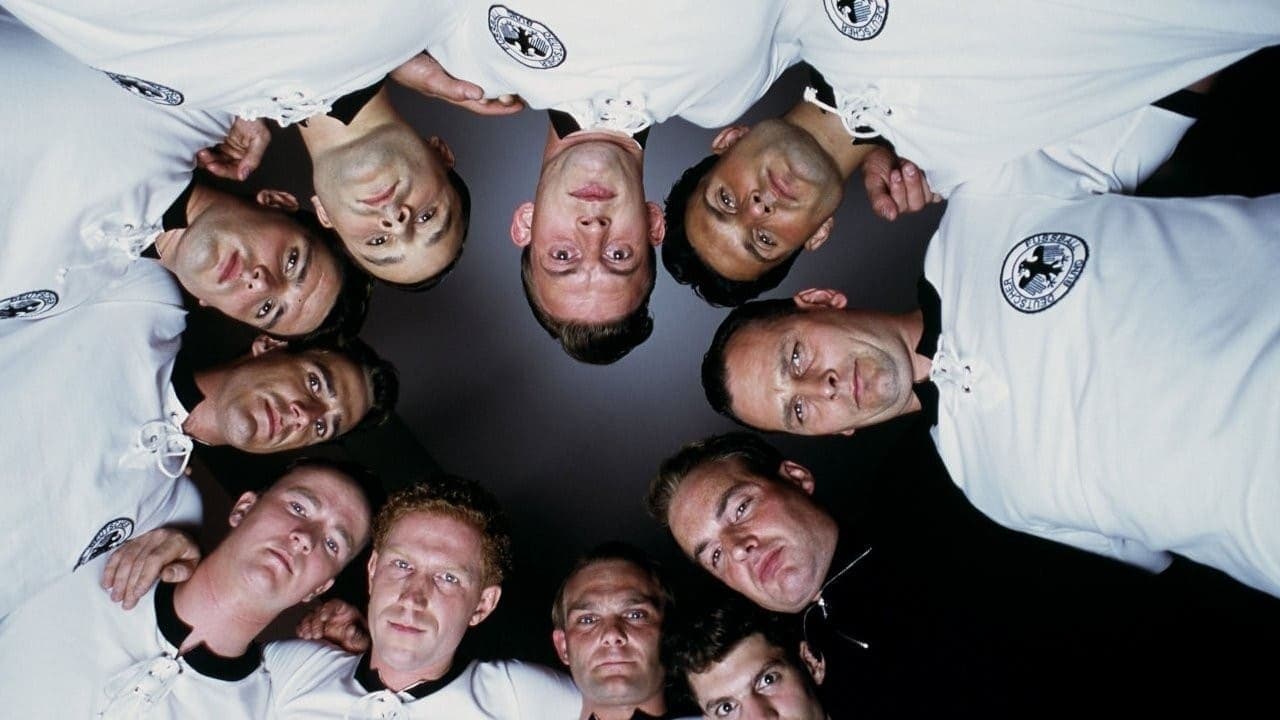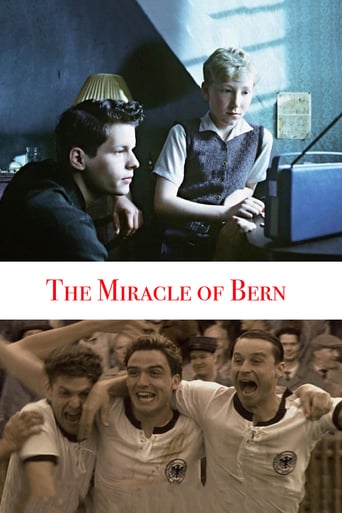

Good start, but then it gets ruined
... View MoreAm I Missing Something?
... View MoreYes, absolutely, there is fun to be had, as well as many, many things to go boom, all amid an atmospheric urban jungle.
... View MoreThe movie's not perfect, but it sticks the landing of its message. It was engaging - thrilling at times - and I personally thought it was a great time.
... View MoreI have no doubt that the 1954 World Cup win for Germany was important to a nation trying to move out of the shadow of Nazism and the deserved defeat they suffered in World War II. This movie does a fairly good job of conveying that emotion, and of depicting life in a poor town less than a decade after Hitler. I also liked the music, which was supportive without being overly dramatic or emotional. Much of the acting was also good.I can't say the same for the script or plot, which were predictable (I don't mean the historic truth of the World Cup, of course, but the fictional family developments), highly sentimental, and annoyingly manipulative. The father was a cardboard character whose actions I didn't believe for a second, and what he did to provide a dinner for his wife was totally implausible. If the movie was aimed at eight-year-olds who need something completely lacking in subtlety, so that every plot point is as obvious as a road sign, then it succeeded. Adults, though, will find it as thin as onionskin.The trip by father and son to Bern for the final match cheated by having them drive through gorgeous Alpine scenery, when a real trip would not have been anything like so beautiful. If filmmakers will cheat on something like that to get an easy reaction from the audience, they'll cheat on everything.
... View MoreIt is largely misleading to think of "Das Wunder von Bern" as a film about football history. Although the film is set in 1954, during the World Cup in Switzerland, there is essentially no World Cup football shown until the last half an hour, which features the final game of the tournament. The film is really about life in Germany in the early 1950s and the resurrection of the country from the ashes of the Second World War. The world title of the German team, totally unexpected for the World Cup first-timers before the championship, serves as a metaphor for this resurrection, and the fact is that it did spurt a resurgence of national pride and determination. Yet most of the football in the film is played by kids with rag balls, in the muddy back streets of the Ruhr region. A middle class German family living in this area is the encapsulation of German joys, trials and tribulations from the period working day and night to make ends meet, welcoming back the surviving prisoners of war, struggling to readjust them in society, the clashes between former Nazi soldier fathers and their "new-born" communist sons, the East-West Germany divide, the advent of television, rock'n'roll dancing balls (or was that just a few months ahead of time?), and of course football as the game of the working and middle classes. In my view, all this is introduced naturally and in good taste, without unneeded pathos, exaggerated martyrdom or heroism one thing that sets it apart from the typical Hollywood production. The acting is anything but flashy, but so was life there and then. I would say that the cast manages to hit just the right tone and the performances of Louis Klamroth and Peter Lohmeyer as father and son Lubanski are remarkable. Another difference between this film and a major studio blockbuster is that when it does come to football, the realism is uncompromising. The casting team spent some time on choosing actors who resemble the actual players as nearly as possible (the similarity in appearance and manner between Péter Franke and coach Sepp Herberger is almost uncanny). Moreover, these people know how to pass the ball, so that the need for special effects and stand-ins is minimal (also the exact opposite of Hollywood standards). The recreation of the final game itself is pedantic to the smallest detail, with not only the goals, but even trivial situations in midfield and radio commentary being reproduced with startling faithfulness. OK, the filmmakers forget to mention that Hungary had a goal disallowed for offside in the last minute, but apparently this decision was never in doubt. In the final scene of the film the hyped-up statements about how this sporting exploit launched a whole nation in the orbit of greatness that we have come to expect from Hollywood, are nowhere to be seen; they are replaced by a matter-of-fact reminder of the ephemeral nature of sporting successes. But don't get me wrong, this is a good (and not just a "feel-good") film on its own merits, not just because it's a Hollywood antidote.
... View MoreI just watched "Das Wunder von Bern" and I must admit it is really a good film, not only for football fans (for you Americans: we Europeans say football for soccer). The film is not just a sports drama but deals more with the atmosphere in post war Germany and with the problems and aspirations the people had during that period and what the winning of the world championship by the German national football team meant for the regular people.Actually this atmosphere is covered excellently. The film shows that the people were still recovering from WW2. There are heaps of debris in the streets from houses destroyed during air raids and many men are still kept as POWs so that the women have to take care for the family. The children play football with a makeshift ball, and most people don't seem to have much money. Everything is shown in subdued colors which really contribute to this mood. Although the story is set in Essen, a city in the main industrial and mining region of Germany, it could have happened everywhere in Germany. The colors only change during the scenes in Switzerland, where the world championship took place. In fact those scenes are shot in bright and friendly colors. And also the settings are quite different from those in Essen: whereas the location in Essen consists of small apartment buildings, narrow streets and those aforementioned subdued colors, everything in Switzerland seems to be posh and spacious.Even though the actors are not exactly great names in German cinema, they are quite good. As far as I know the actors who play the members of the German national football team were cast not only for their acting skills but also for their ability to play football. Thanks to that aspect the football scenes are quite convincing (although the spectators in the football stadium in Bern look really fake).What I really liked though was the fact that the filmmakers used the original radio commentary from reporter Herbert Zimmermann, which is legendary. Every German football fan knows the important parts of his commentary by heart.All in all a good and entertaining film, although I didn't really like the ending.
... View MoreThe film managed to avoid cliches about this period of history, which a few of us can still remember. The interweaving of several stories, which sometimes seems miraculous, is well directed by Soenke Wortmann.
... View More